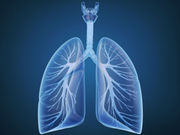Higher doses independently linked to slower change in emphysema, especially among former smokers
MONDAY, May 8, 2017 (HealthDay News) — Angiotensin-converting enzyme (ACE) inhibitors and angiotensin II receptor blockers (ARBs) might play an important role in the prevention and treatment of emphysema, according to a study published in the May 1 issue of the Annals of the American Thoracic Society.
Megha A. Parikh, from Columbia University in New York City, and colleagues recruited 4,472 patients ages 45 to 84 years from the general population. The authors examined whether ACE inhibitor and ARB dose is associated with progression of percent emphysema by computed tomography (CT).
The researchers found that 12 and 6 percent of participants used an ACE inhibitor and ARB at baseline, respectively. At baseline, the median percent emphysema was 3.0 percent; over a median of 9.3 years the rate of progression was 0.64 percent. There was an independent correlation for higher doses of ACE inhibitor or ARB with slower change in percent emphysema (P = 0.03). Over 10 years the predicted mean increase in emphysema among participants who used maximum doses of ARBs or ACE inhibitors was 0.06 percent, compared with 0.66 percent for those who did not take ARBs or ACE inhibitors (P = 0.01). The greatest magnitude of findings was seen among former smokers (P < 0.001).
“In a large population-based study, ACE inhibitors and ARBs were associated with slowed progression of percent emphysema by chest CT, particularly among former smokers,” the authors write.
Abstract
Full Text (subscription or payment may be required)
Copyright © 2017 HealthDay. All rights reserved.








